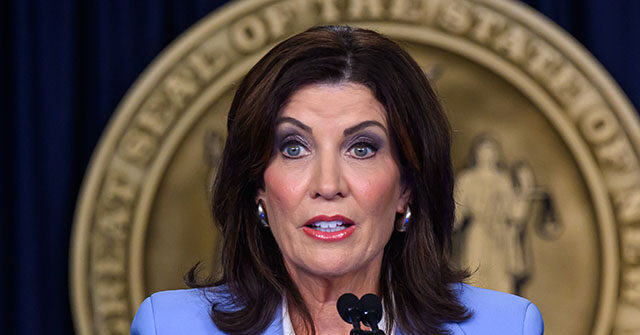In a recent interview, House Conference Chair Elise Stefanik (R-NY) criticized New York Governor Kathy Hochul (D) for her remarks suggesting that voters supporting Republican candidates are “anti-American” and “anti-women.” This comment from Hochul sparked a strong backlash from Stefanik, who pointed out that this kind of rhetoric has become a recurring theme among Democrats, who have historically sought to vilify their political opponents. Stefanik’s condemnation underscores a growing frustration within the Republican Party regarding the divisive language used by Democrats.
Stefanik’s criticism reflects a broader narrative of Democrat-led attacks on Republican supporters, recalling previous derogatory labels such as “Deplorables” and comments from prominent figures like Joe Biden and Kamala Harris. These rhetorical tactics, which she highlighted, aim to undermine the legitimacy of opposing political beliefs by framing them in extreme negative terms. Stefanik argues that Hochul’s comments signal a desperation from the Democratic Party as it approaches upcoming elections, suggesting that their campaign strategies rely heavily on personal attacks rather than substantive policy discussions.
The comments from Hochul specifically label Republican supporters as being against women’s rights and American values, a perspective Stefanik finds particularly offensive and misleading. She strongly asserts that such insinuations are not only inaccurate but also reflect a lack of respect for the diverse viewpoints held by voters across the political spectrum. In her view, these characterizations are indicative of a losing strategy by Democrats, as they fail to engage with the actual concerns and values of the electorate.
Stefanik called Hochul the “Worst and most unpopular Governor in America,” further reinforcing her point that Hochul lacks the authority or credibility to make such sweeping judgments about voters. This assertion not only aims to diminish Hochul’s standing but also serves to rally Republican voters by framing them as unjustly attacked victims of a flawed political strategy. By positioning Hochul’s attacks as an act of desperation, she seeks to motivate Republican supporters to mobilize in response to these perceived injustices.
In summary, the rhetoric displayed by Hochul and echoed by other Democrats appears to reflect a consistent pattern of personal attacks directed toward Republicans and their supporters. Stefanik’s public comments amplify a sentiment within the Republican base that such approaches are counterproductive and politically damaging. She argues that instead of vilifying voters, candidates should focus on genuine dialogue about issues that matter to the American populace.
The conversation around political attacks and voter characterization highlights the deepening divisions within American politics today. Stefanik’s reaction to Hochul’s comments provides insight into how the Republican Party plans to navigate these tensions and galvanize support as elections approach. By framing the current political climate in terms of misrepresentations and unjust accusations, Republican leaders like Stefanik hope to reclaim the narrative and foster a more unified, engaged electoral base.

